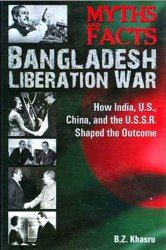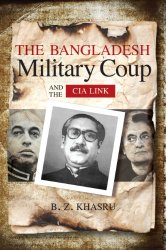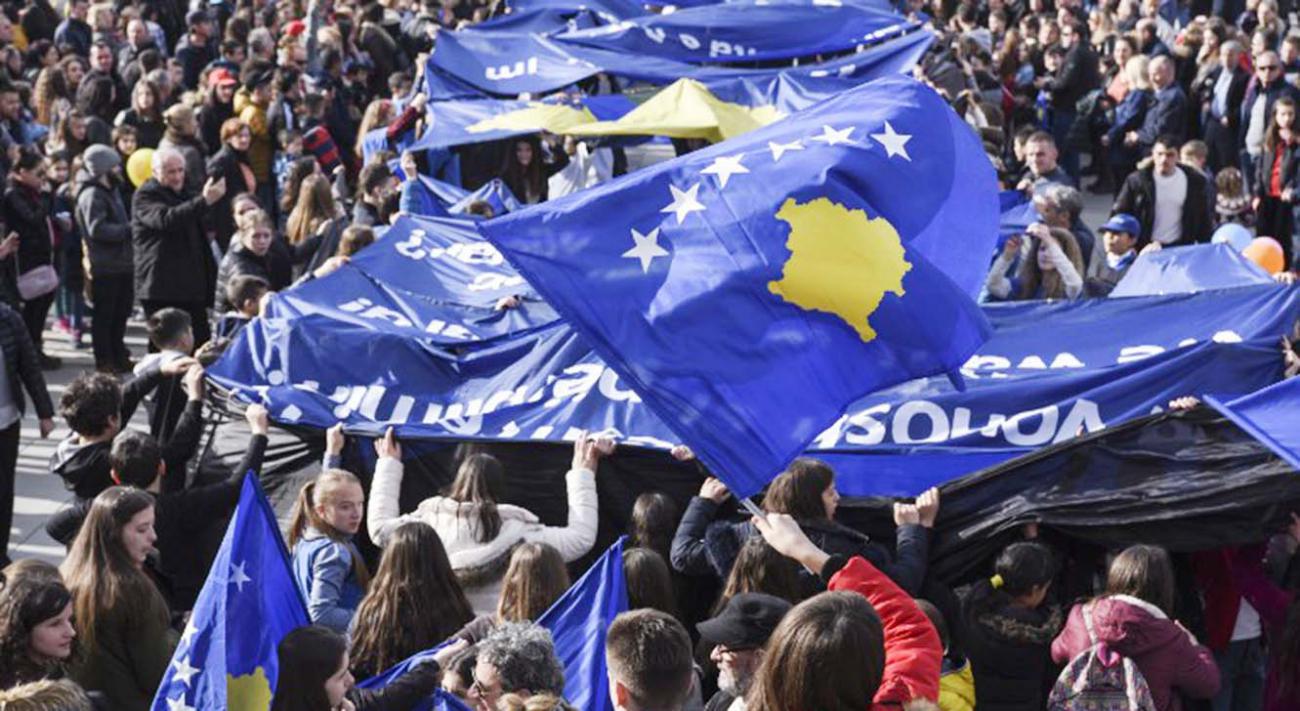by B.Z. Khasru
When seemingly unending political street-battles gripped Bangladesh in late 2006, the United Nations pushed the country’s military in a circuitous way to take over the administration, brazenly violating its own charter that bars the world institution from interfering in any member state’s internal affairs.
The UN coerced the reluctant Bangalee generals by threatening them with the loss of their participation in international peacekeeping jobs, which are highly prized by Bangladesh’s armed forces. On 11 January 2007, the military grudgingly agreed to rule the country from behind the scenes and created a facade of a civilian administration with an ailing president and a rubber-stamp council of advisers, who acted as cabinet ministers. This unprecedented political posture was dubbed as “one-eleven” in Bangladesh, mimicking “nine-eleven” in the United States.
Pulling strings from behind, the generals in collusion with some “halftelactuals,” or the so-called intellectuals-cum-civil-society thinkers, drew up a misguided agenda; they hatched a plan to send into exile the “two ladies,” the two former prime ministers who lead the country’s two main political parties. In essence, the army sought to send Sheikh Hasina, daughter of the nation’s founding president, Sheikh Mujibur Rahman, and Khaleda Zia, widow of another assassinated president, General Ziaur Rahman, into political oblivion. This experiment, which came to be known in popular parlance in Bangladesh as the “minus two” theory, was an apparent attempt to rid the nation of 165 million people of its dysfunctional dynastic rule.
As part of the plan, the military and the civil-society clique also envisioned manufacturing a third major political force, popularly ridiculed as the “king’s party.” Military intelligence operatives put their machinery into battle-ready mode to recruit the willing and coerce the unwilling politicians from existing political parties to join the proposed organization; some of those who sought to resist the pressure were put under the gun to sign up with the king’s party or face corruption charges and long imprisonment.
The generals initially invited 2006 Nobel Peace Prize winner professor Mohammad Yunus to run the military-backed regime, but the U.S.-trained economist-turned-microfinance-pioneer declined to swallow the bait. He realized the peril of assuming state power with the help of the khakis. But he eventually succumbed to the temptation and decided to throw his prestige into the messy ring of Bangalee politics, committing the gravest blunder of his life yet. In his game plan, the Nobel laureate counted on his eighty-five million soldiers of Grameen Bank to serve as vanguards of his political revolution and crown him with victory. By doing so, he grossly miscalculated the intrinsic power of the politicians who are backed by indoctrinated, die-hard cadres and well-established political machinery.
Within months after One Eleven, General Moeen Ahmed, the army chief who at first was less than thrilled to get involved in the running of the civilian administration, developed a nose for the sweet smell of power and made pubic his desire to bless the nation as president.
But the two iron-willed ladies trounced the generals with their political guns and proved the resilience of popular politics, a favorite pastime in Bangalee homes. Sheikh Hasina, current prime minister and president of the Awami League, especially made a brave move by returning home in 2007 from a trip to the United States, ignoring warnings that she would face military trial on corruption charges. Embolden by Hasina’s dramatic return, Khaleda Zia, who leads the main opposition Bangladesh Nationalist Party, refused to leave Bangladesh for exile as planned earlier under a deal with the military, putting the generals in disarray. The United States strongly opposed the military’s attempt to sideline the two main political parties, fearing such an action could create a political vacuum and give theocratic Bangladesh Jamaat-e-Islami party an opportunity to capture power.
By all accounts, the army’s two-year stint was marked by dismal failures, a fiasco that irreparably damaged the military’s image as an institution to which the Bangalees looked upon as savior in times of trouble. In the end, the military leaders had to find a face-saving way for a retreat, surrendering their ambitious plans at the feet of the very politicians they despised and sought to undermine.
To put it in a different light, this retreat by the armed forces has created an unexpected positive outcome for the nation’s political process by diminishing prospects for future military maneuvers into politics. Bangladesh, which has witnessed dozens of armed mutinies resulting in assassinations of presidents and generals since its bloody birth through a nine-month civil war against Pakistan in 1971, may finally look forward to an era in which rulers will be able to focus on ruling the country, rather than worry about getting assassinated.
But an ominous sign unfolded after Hasina returned to power in 2009 with an overwhelming majority in parliament: She declared war on Yunus and his backer, the United States.
U.S.-Bangladesh relations are at their nadir since the creation of the South Asian nation 43 years ago. The current state of affairs between the two nations was recently summed up by Dan Mozena, the outgoing U.S. ambassador to Bangladesh, which is now part of a vital strategic region for the United States. “The U.S. interaction with the sitting government is not business as usual,” the envoy told journalists in Dhaka, Bangladesh’s capital. No one can recall a U.S. diplomat in Dhaka making such a blunt comment even when Bangladesh tilted toward the Soviet Union soon after its birth because of President Richard Nixon’s opposition to its independence in 1971. How did the situation get to this point now?
During my visit to Bangladesh in 2010, I asked several journalists at the Dhaka Press Club why Hasina was after Yunus. I got two answers: One, she got angry because the micro-finance pioneer supported Bangladeshi military’s plan to banish the nation’s top two politicians. Two, Hasina was upset because she believed she – instead of Yunus -deserved the Nobel prize for her role in ending a decades-old tribal insurgency in eastern Bangladesh and that Yunus somehow manipulated the Nobel committee through strong-armed lobbying with help from his American friend, Bill Clinton, former U.S. president.
Like many other things that happened in Bangladesh, the two explanations given to me by the journalists continued swirling around and became popular myths at home and abroad. No one could, however, cite any authoritative source to back up the explanations. Given the fact that rumor mills work overtime all the time in Dhaka, it was not surprising that these two myths have survived.
Yunus’ support for the military’s plan to exile the two ladies hardly caused any wrinkles in Hasina’s mind. In fact, she takes credit for facilitating the military’s role in running the government in an attempt to push the 2007 the general election forward. Her party, the Awami League, was poorly prepared for the polls and she feared electoral defeat. She has publicly stated that her actions – continuous violent street protests late 2006 – paved the way for the military to run Bangladesh from behind the scenes from 2007 to 2009.
The fact remains Yunus, a former economics professor, ended his ill-conceived idea of entering politics shortly after he had floated it, thus removing any perceived threat to Hasina or Khaleda. It would defy logic to think that Hasina would start a diplomatic war over a non-existent threat and oust Yunus from Grameen Bank, as she did in 2011. Likewise, the myth that Hasina was upset because Yunus won the Nobel prize stemmed from statements by her aides that the professor donated money to the Clinton Global Initiative in exchange for a promise by Clinton that he would lobby the Nobel committee. Hasina herself mentioned this only in connection with a remark to belittle Yunus, saying he would do anything to promote himself. Hasina, rather, was miffed by Yunus’ statement that eighty-five million Grameen members were not only citizens but also voters, a veiled threat that they could punch a mega hole in the Awami League’s ballot box.
The root of Hasina’s displeasure with the United States goes way back—to the assassination of her father by some junior officers of the army. Hasina stills believes deep down that the United States, which opposed Bangladesh’s creation in 1971, was involved in the military coup in which most of her family members were killed. Hasina and her sister, Sheikh Rehana, survived because they were overseas. Hasina once told William Milam, a former U.S. ambassador to Bangladesh, that many Awami League members still think Washington was responsible for her father’s demise. She asked Milam point blank back in 1991 whether the United States would seek to prevent her from becoming prime minister. Milam denied U.S. involvement in her father’s assassination and assured her that the United States would welcome her as prime minister of Bangladesh if her political party won majority seats in parliament. Howard Schaffer, another former U.S. ambassador to Bangladesh, laments that in her dark moments Hasina believes the United States was somehow implicated in her father’s death.
Despite having latent grudges against Washington, Hasina had not directly turned her gun against the United States until the World Bank suspended in 2012 a loan to build a bridge. In fact, Hasina was pretty warm to both Yunus and Washington. So strong was her desire to solidify her ties with the United States that her new government waged a low-key campaign to persuade President Obama to choose Muslim-majority Bangladesh as the venue for his speech to the Muslim World. She expressed her wish to visiting former Assistant Secretary Karl Inderfurth in February 2009. Hasina and her inner circle intended to enlist Yunus to make the case for Obama’s visit to Dhaka.
Hasina’s wrath fell on Washington after a World Bank decision to cancel the $1.2 billion loan for the Padma River Bridge to connect southern Bangladesh with the capital city, Dhaka, an ambitious project that is expected to boost Bangladesh’s gross domestic product by an estimated 1 percent. Successful construction of the bridge would be a crowning achievement for the prime minister and cement her grip on the electorate. The bank alleged a bribery plot in which Hasina’s sister, Sheikh Rehana, and a former minister in her previous administration, Abul Hossain, were implicated.
The bank acted based on a kickback allegation in awarding bids. A bribery case involving a Canadian construction company – SNC-Lavalin – is pending in Canada. Hasina believes that Yunus, a Congressional Gold Medal winner, influenced the United States to instigate the World Bank to level the bribery charge to politically cripple her in an attempt to install the professor as Bangladesh’s future leader. She sees a parallel between her own situation and that of her father’s. The United States welcomed Khandaker Moshtaque Ahmed, who was widely known as a pro-West man during the height of the Cold War, as Bangladesh’s president after her father’s murder in 1975.
Added to these past dark episodes are current U.S. efforts to force Hasina to include the main opposition Bangladesh Nationalist Party in the political process. Hasina held parliamentary elections in January, but the BNP demanded her resignation before the polls and boycotted them. Washington has been mounting pressure on Hasina to hold fresh elections to accommodate the BNP. This reinforced the prime minister’s deep-seated belief that the United States remained fundamentally hostile toward her. Both Hasina and her cabinet colleagues have been voicing publicly their irritation over the matter. One recent comment made by Finance Minister A.M.A. Muhith succinctly illustrates the point: Washington is making “a mistake by pressuring Bangladesh on matters related to its internal politics and other issues.”
Washington has been at odds with New Delhi, too, over squeezing Hasina for new polls. India sees its own interest better served by having her as prime minister, while the United States believes Bangladesh can enhance its goals by being a stable democracy, regardless of whoever is in power.
Long before Sheikh Hasina returned to power in 2009, India made its preference clear. During a trip to New Delhi in 2004, Hasina, then leader of the opposition, received nearly all the formalities of an official visit. With the exception of a Hyderabad House reception, which is strictly reserved for heads of state or government, her sojourn to India included all the trappings of a state visit, including calls on Prime Minister Manmohan Singh, Foreign Minister K Natwar Singh and Leader of the Opposition L.K. Advani, and a dinner hosted by the foreign minister. Her ties with India have since further solidified.
With India solidly behind her because of her political party’s non-religious philosophy and the possibility of military interference in Bangladesh politics greatly diminished, Prime Minister Sheikh Hasina is unlikely to bow to outside pressure unless and until she faces mass upsurge within the country.
Source: Foreign Policy










